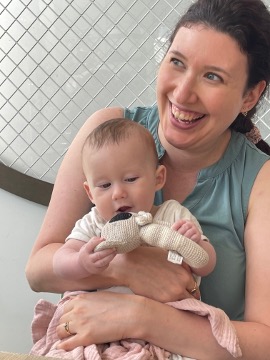Five life lessons from Maternity leave

This is a guest blog written by Laura Hughes-Onslow from The Sutton Trust and Lila Dowie from Demelza Hospice Care for Children.
Last September, I closed my laptop ahead of starting maternity leave, certain there would be very little to connect my day job working with corporate partners and my year ahead raising a tiny human.
It was through a cuppa and a chat with Lila, on maternity leave for the second time, that we reflected on how much we were learning and how much was relevant for fundraising. We recorded a session called ‘Motherhood, Management and Making it Work’ for the Corporate Partnerships Everywhere conference and the comments blew us away – it’s clear that this topic resonates.
For anyone thinking about becoming a parent, no matter where you are on that journey, we want to send our warmest wishes. We hope our reflections are useful life lessons for all hoping to achieve remarkable corporate partnerships.
1. Do it Now
We have both become much more decisive since becoming parents – there are hundreds of micro-decisions to make each day for our babies. We all lead busy lives and need to focus on what’s important. We trust that if something must get done, then it will.
Action: Pick one thing on your to-do list and do it now (before reading the rest of this article). Send that email, pick up the phone, have that conversation with a colleague, draft the copy, crop that picture for your proposal that won’t sit neatly alongside your words.
2. Planning with flexibility
When preparing for labour, we both outlined birth preferences, knowing that sometimes things don’t go to plan. We’ve all had that moment where a corporate partnership falls outside of our expectations – raising more or less than we’d expected. We’ve learnt to adapt our days as things aren’t always in our control, and to go with it.
Action: Go through your corporate plans and work out what’s in your control and what isn’t, have several options laid out for what to do if corporate partners fall short or exceed their fundraising targets so you can quickly respond.
3. It takes a village
We both rely on our communities daily to juggle raising babies alongside other priorities. In the early days, such as change nappies without getting weed on, meant we were able to step away. Finding friends and allies in the workplace makes us much more successful, as fundraising is a whole-organisation effort. Plus, we can always learn how others do things.
Action: Find a colleague in another team to lead a meeting or run a presentation - support and encourage them, and use that time to instead focus on essential emails and admin.
4. Rest and re-charge
Building in pockets of time for resting is essential for self-care. Our jobs and lives are full of deadlines and targets so taking time as a team to actively plan for quieter reflections periods help us be at our best – as mothers and as managers.
Action: Identify your busiest time in the calendar year and actively plan some annual leave or team retreats for the weeks following, to proactively have time to rest and re-charge.
5. Be honest
Sometimes the things we feel most vulnerable about are what can connect us most to others. Being open about the challenges of parenthood, or the emotions we feel when hearing beneficiary stories – help us to relate to others and build stronger relationships.
Action: Take time at the start of meetings to ask meaningful questions – find out how someone really is: what are the challenges in their jobs, where are they going on holiday, are they celebrating birthdays or milestones? Actively listen and relate back, and enjoy building those connections.
We would love to hear your feedback and continue this conversation. Please share your reflections and any life lessons you’d like to contribute to team@remarkablepartnerships.com.





